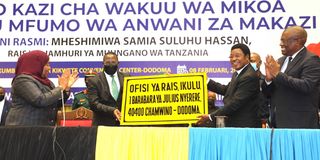Samia: What residential address system means

President Samia Suluhu Hassan witnesses as Vice President Philip Mpango receives the address plate for the President’s Office, Chamwino State House, on her behalf from Prime Minister Kassim Majaliwa at the end of the work meeting with regional commissioners on the national physical address system in Dodoma yesterday. PHOTO | STATE HOUSE
What you need to know:
- Initially cost estimates stood at Sh700 billion but this has been cut down to Sh28 billion, whereby each region will be allocated funds depending on size
Dar es Salaam. President Samia Suluhu Hassan said yesterday that the National Physical Address system that is expected to be finalised in May, 2022, will connect Tanzania to the rest of the world and strengthen safety and security of the country as well as enable economic and social development.
The system, she said, will also end land conflicts that have been facing the country for decades. This will be so because every person’s information will now be on record.
Speaking in Dodoma yesterday during a working session with regional commissioners, President Hassan said it was imperative to recognise where every person was to be accessible by service as well as recognise the majority of digital businesses that have been laying low to enable the government to get its taxes. “Initially, the project cost estimates stood at Sh700 billion, but we cut it down to Sh28 billion by using our own experts to work on the project while at the same time leaving it to Tanzanians to draw out their addresses,” she said.
She called on local governments to involve the public who will be strong ambassadors and guards to protect their streets and the infrastructure that will be put in place.
“If we involve the people in this process, the exercise will be easier and less expensive than we expected. Even in the demarcation of areas we know some have not been surveyed so the citizens themselves will help,” she said.
“The exercise will create sports for the youth, competition between one street and another will create good players…,” she said.
She said developed countries use the residential address system as a basis for identifying citizens and their property, offices and businesses.
Explaining she said the money will be disbursed according to the size of regions on all sides (Tanzania Mainland and Zanzibar), emphasizing that the money should not be classified as OC (other expenditure) by regional authorities.
Earlier, the minister for Information, Communication and Information Technology, Mr Nape Nnauye, said the system identifies where a person is and what service to be served whether at home, in the office or business area.
He said the system will enable the digitilisation of Tanzanian economy, noting that social development relied heavily on such a system.
“You will remember in 2020 when you asked for Tanzanian votes you promised Tanzanians through the CCM Election Manifesto for the year 2020/2025, that by 2025 each Tanzanian will have an address for residence, place of work or business,” he said.
He said the ministry has already built capacity for all regional and council executives.
He noted that they were committed to ensure they complete the system before the Population and Housing Census which will be conducted later this year.
The permanent secretary in the Ministry of Information, Communications and Information Technology, Dr Jim Yonazi said the system will make Tanzania the most accessible country in East Africa after May 2022.
“The process started in 2010 and was expected to be finalized in 2015 but due to financial constraints, it was not possible. However, to date at least 135 wards including 127 in Tanzania mainland and 8 in Zanzibar have the postcodes. This is equivalent to three percent,” he said.
He noted that the government was currently preparing bylaws and digital maps to reach countrywide.
The Deputy Minister for Lands, Housing and Human Settlements Development, Mr Ridhiwani Kikwete said the digital map being prepared by the Lands ministry was key to the implementation of the system.




